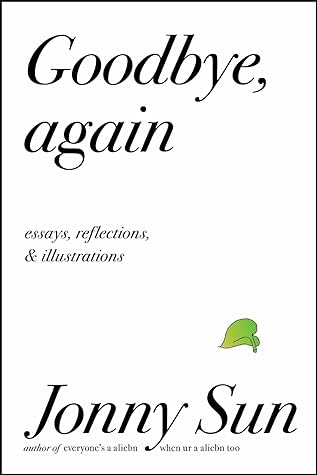More on this book
Community
Kindle Notes & Highlights
Loving something is very specific, nuanced.
I have taught myself to feel like I am constantly failing everyone around me because it pushes me to get things done.
If a home is who you are, in a way, rendered physically and externally, then to stay at a friend’s home is to stay not only with them but also among them, surrounded by this external expression of them.
whereas after I leave, we might not speak to each other for months, sometimes even years, knowing that we are always one message away from each other but the ease of that closeness means we can talk at any time, and so there is no specific urgency to do so, and so we put it off, and we put it off, and we put it off.
I am trying to pressure myself less on what a friendship “should” be.
I’ve never been sure what friendship even is, but even so, sometimes I worry, shouldn’t it be more than this?
Who or what is influencing my thinking on what friendship “should” look like, anyway? Where did I learn that from, and why do I give that authority over my own experiences? Is there some standard for friendship that I internalized from a kids’ show, decades ago, before the internet, before I grew up into a world that a kids’ show never could have predicted, that I somehow still hold myself to? If my friendships don’t adhere to the expectations I’ve learned from TV, from media, from hearing stories about other peoples’ close friendships, then does it mean I don’t have any “real” friends? Or do
...more
I have a certain nostalgia for happy moments, from years and years ago, that I do not remember feeling happy during.
It feels pretty close because it is to look back and try to reassure myself, “Now that it is over and it has happened, it is safe to finally feel the happiness you wanted to feel about it. Now you can feel happy because now your happiness will not get in the way, will not change the outcome, it cannot ruin it somehow in the way you think that happiness might, because it’s already happened. It’s locked away in the past. The memory has finally hardened into stone.”
So this nostalgia is, what, an echo of a happiness? Or a long-delayed one?
Or, maybe nostalgia is to feel a happiness about something that is over because it is over. That in order to feel happy about it, it must be something that you can’t go back to and affect, that you can’t mess up from where you are now, but also, that you can’t really feel at all.
We cannot seem to escape the desire to feel productive with our time. I’m not sure if that’s by choice or by trauma, that this pressure to produce has been so engrained in us that our deepest fantasies are still tied to some idea of working on something.
Perhaps after a life of working to no end with no promised outcomes, what we think we want more than anything is to escape into this fantasy that something reliable will happen when we put our time into it. Plant a crop, tend to it, and something will grow.
I don’t know if it’s healthy, but at least it helps me separate my anxiety from myself. It’s not who I am, it’s not my personality, it doesn’t represent me. It’s just a tax I pay so that whoever I really am can go about his life.
One thing that has made me less anxious about talking to people is focusing on this notion that a conversation is a gift of somebody’s time and attention.
On MSN, though, there was proof the conversation happened—it was written down! If I forgot what someone said, or if I was worried that someone didn’t like me, I could just scroll up and look at all the words we wrote out to each other and find comfort in having some sort of tangible evidence that we had given all this time and attention to each other previously.
But there’s a part of me that tells myself that if I were important, if I were truly important, my leaving would have had an impact. It would have done something. There would have been a hole that I left behind that people would notice. Instead, everything just keeps going on without me. And it feels like the lesson is, you don’t matter.
Every act of moving is also an act of removing, leaving an empty space where what moved is no longer there. It’s just, the problem with leaving is that you’re never able to stick around to see what you’ve left behind.
Mourning does not only apply to death. You are allowed to mourn change, as well.


